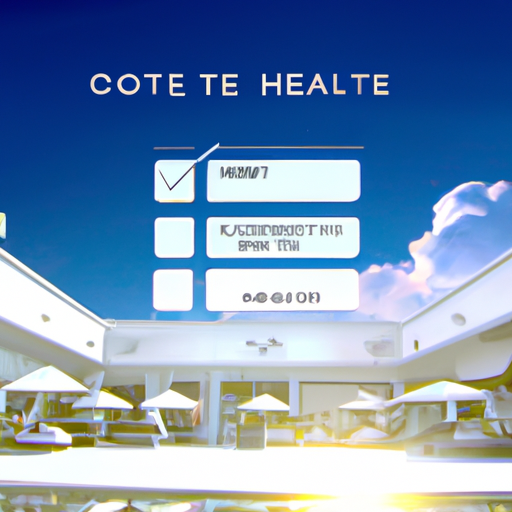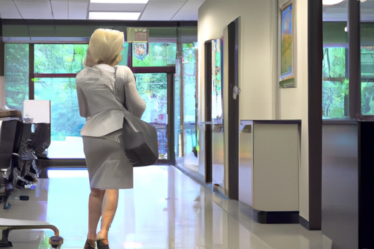
Benefits of Cloud Computing for Hotels
Cloud computing has revolutionized the way businesses operate, and the hotel industry is no exception. With its numerous benefits, cloud computing has become an essential tool for hotels looking to streamline their operations and enhance their guest experience. In this article, we will explore the various advantages that cloud computing offers to hotels, making it a comprehensive checklist for hotels in the cloud.
One of the primary benefits of cloud computing for hotels is its cost-effectiveness. By moving their operations to the cloud, hotels can significantly reduce their IT infrastructure costs. Instead of investing in expensive hardware and software, hotels can simply pay for the services they need on a subscription basis. This eliminates the need for upfront capital expenditure and allows hotels to scale their IT resources up or down as per their requirements.
In addition to cost savings, cloud computing also offers hotels increased flexibility and scalability. With cloud-based solutions, hotels can easily add or remove services as their needs change. For example, during peak seasons, hotels can quickly scale up their reservation systems to handle increased demand, and then scale them back down during slower periods. This flexibility allows hotels to optimize their resources and ensure that they are always operating at peak efficiency.
Another significant advantage of cloud computing for hotels is improved data security. Cloud service providers invest heavily in state-of-the-art security measures to protect their clients’ data. By storing their data in the cloud, hotels can benefit from these robust security measures, which are often more advanced than what they could afford to implement on their own. Additionally, cloud-based systems offer automatic backups and disaster recovery options, ensuring that hotels can quickly recover their data in the event of a system failure or a cyberattack.
Cloud computing also enables hotels to enhance their guest experience. With cloud-based property management systems, hotels can streamline their check-in and check-out processes, reducing wait times and improving guest satisfaction. Cloud-based systems also allow hotels to offer personalized services to their guests, such as customized room preferences and tailored recommendations based on their previous stays. This level of personalization can significantly enhance the overall guest experience and increase guest loyalty.
Furthermore, cloud computing enables hotels to access real-time data and analytics, providing them with valuable insights into their operations. With cloud-based analytics tools, hotels can track key performance indicators, such as occupancy rates, revenue per available room, and guest satisfaction scores. This data can help hotels make informed decisions and identify areas for improvement, ultimately leading to better business outcomes.
In conclusion, cloud computing offers numerous benefits to hotels, making it an essential tool for the industry. From cost savings and increased flexibility to improved data security and enhanced guest experience, the advantages of cloud computing are undeniable. By embracing cloud-based solutions, hotels can streamline their operations, optimize their resources, and stay ahead in today’s competitive market. So, if you’re a hotel looking to take your business to the next level, it’s time to check off cloud computing from your comprehensive checklist.
Key Considerations for Implementing Cloud Solutions in Hotels

Are you a hotel owner or manager looking to implement cloud solutions in your establishment? If so, you’ve come to the right place. In this article, we will provide you with a comprehensive checklist of key considerations for implementing cloud solutions in hotels. By following this checklist, you can ensure a smooth and successful transition to the cloud.
First and foremost, it is important to assess your current IT infrastructure. Take stock of your existing hardware, software, and networking capabilities. This will help you determine what needs to be upgraded or replaced to support cloud solutions. Additionally, consider the scalability of your current infrastructure. Will it be able to handle the increased demands of cloud-based systems?
Next, you should evaluate your data security measures. Cloud solutions require the transfer and storage of sensitive guest information, so it is crucial to have robust security protocols in place. Look for cloud providers that offer encryption, firewalls, and regular security audits. Additionally, consider implementing multi-factor authentication for added protection.
Another important consideration is the reliability and uptime of your cloud provider. Downtime can be detrimental to your hotel’s operations, so it is essential to choose a provider with a strong track record of uptime. Look for providers that offer service level agreements (SLAs) guaranteeing a certain level of uptime. Additionally, consider their disaster recovery plans in case of unforeseen events.
Integration with existing systems is another key consideration. Your cloud solutions should seamlessly integrate with your property management system (PMS), point of sale (POS) system, and other essential hotel software. This will ensure smooth operations and minimize disruptions for your staff and guests. Consult with your cloud provider to ensure compatibility and ease of integration.
Training and support are also crucial aspects to consider. Implementing new technology can be challenging for your staff, so it is important to provide comprehensive training and ongoing support. Look for cloud providers that offer training programs and 24/7 customer support. This will help your staff adapt to the new systems and address any issues that may arise.
Cost is always a consideration when implementing new technology. Cloud solutions can offer cost savings in terms of hardware and maintenance, but it is important to carefully evaluate the pricing models of different providers. Consider factors such as subscription fees, data storage costs, and any additional charges for support or upgrades. Compare different providers to find the best value for your hotel.
Lastly, consider the long-term scalability and flexibility of your chosen cloud solutions. As your hotel grows and evolves, your technology needs may change. Look for providers that offer scalable solutions that can easily accommodate your future needs. Additionally, consider the flexibility to add or remove services as required.
In conclusion, implementing cloud solutions in hotels requires careful consideration of various factors. By following this comprehensive checklist, you can ensure a successful transition to the cloud. Assess your current infrastructure, evaluate data security measures, consider reliability and uptime, ensure integration with existing systems, provide training and support, evaluate costs, and consider long-term scalability and flexibility. With these considerations in mind, you can confidently choose the right cloud solutions for your hotel and reap the benefits of improved efficiency and guest satisfaction.
Best Practices for Securing Hotel Data in the Cloud
In today’s digital age, more and more industries are turning to cloud computing to store and manage their data. The hotel industry is no exception, as hotels are increasingly relying on cloud-based systems to streamline operations and enhance guest experiences. However, with the convenience of the cloud comes the need for robust security measures to protect sensitive guest information. In this article, we will provide a comprehensive checklist of best practices for securing hotel data in the cloud.
First and foremost, it is crucial for hotels to choose a reputable cloud service provider. Look for providers that have a proven track record in the industry and offer strong security measures. Conduct thorough research and read reviews to ensure that the provider you choose has a solid reputation for data protection.
Once you have selected a cloud service provider, it is essential to implement strong access controls. This means carefully managing user accounts and permissions to ensure that only authorized individuals have access to sensitive data. Implementing multi-factor authentication can add an extra layer of security by requiring users to provide additional verification, such as a fingerprint or a unique code, in addition to their password.
Regularly monitoring and auditing your cloud environment is another crucial step in securing hotel data. This involves keeping a close eye on user activity and system logs to detect any suspicious behavior or unauthorized access attempts. By regularly reviewing these logs, you can quickly identify and respond to any potential security threats.
Encrypting data is another important best practice for securing hotel data in the cloud. Encryption converts sensitive information into unreadable code, making it virtually impossible for unauthorized individuals to access or decipher. Implementing strong encryption algorithms and regularly updating encryption keys will help ensure that your data remains secure.
In addition to encrypting data, it is also important to regularly back up your data. This means creating copies of your data and storing them in a separate location. In the event of a security breach or data loss, having backups will allow you to quickly restore your systems and minimize downtime.
Regularly updating and patching your cloud systems is another critical step in securing hotel data. Cloud service providers often release updates and patches to address security vulnerabilities and improve system performance. By promptly applying these updates, you can ensure that your systems are protected against the latest threats.
Educating your staff about cybersecurity best practices is also essential for securing hotel data in the cloud. Train your employees on how to recognize and respond to phishing attempts, the importance of strong passwords, and the risks associated with sharing sensitive information. By fostering a culture of cybersecurity awareness, you can significantly reduce the risk of data breaches.
Lastly, it is crucial to have a comprehensive incident response plan in place. Despite your best efforts, security incidents can still occur. Having a well-defined plan that outlines the steps to be taken in the event of a breach will help minimize the impact and ensure a swift and effective response.
In conclusion, securing hotel data in the cloud requires a comprehensive approach that encompasses choosing a reputable provider, implementing strong access controls, monitoring and auditing, encrypting data, regularly backing up data, updating and patching systems, educating staff, and having an incident response plan. By following these best practices, hotels can protect sensitive guest information and maintain the trust of their customers in an increasingly digital world.


